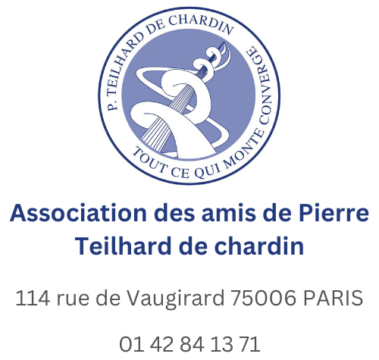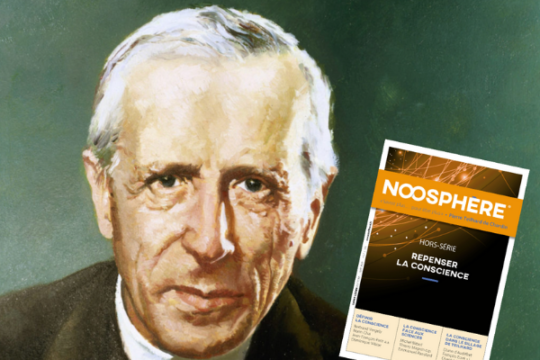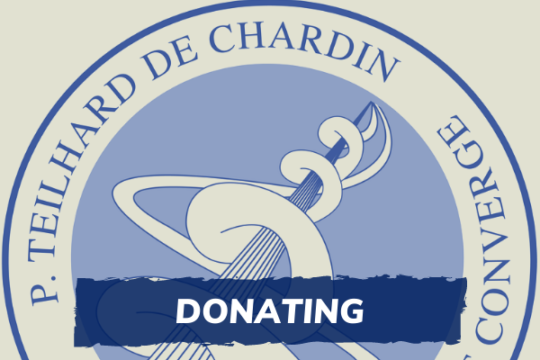Dear friend,
I received with joy, and read avidly your letter of March 27. How many questions it raises, which I hope we will be able to discuss together at length some day, so that something may come of our efforts for the glory of God.
[…] What do you want, – with all my being I have faith in Life, – not only in the supernatural life which crowns all individual existence and will consume all universal becoming, – but in the earthly life too, base of the other, of which we are humble rings, and which continues through us. I believe that in the world of earthly life, something great is being done, desired by God, expected by God, which must serve to build the new Jerusalem, and which is being done through misery and wars. Obviously, in the details of human struggles and efforts, we see the worship of idols, the profusion of lies. But can’t all this serve the good, to advance the Holy Cause ? […] War, in itself, is an evil, like a disease. The great social groups constitute a superior matter where the conscience penetrates only slowly and whose determinisms enslave and oppress us… Their ” animation “, their moralization, is a great work, which can only be pursued in the midst of the formidable and painful shocks by which a crowd of poor individuals are crushed. It is not for nothing that N.S. wanted his Cross to dominate the Earth. – The present war appears to me as one of those shocks through which the natural Universe progresses according to the divine plans (you may smile, but, I repeat, I have the ” faith “… perhaps quite blind). And I like to think that I am an atom used for that by the Creator. – By virtue of the same conceptions, I would gladly add an element to your system of unifying the lives of the scholar and the Christian. If I am not mistaken, you are especially struck by the work of elaboration which continues in the individual soul, in the faculties of the scientist. “The Christian, you say, will cultivate with devotion and love, science to make himself, during his life, a truer and greater image of God, and, at the same time, to sharpen, in himself, a more penetrating intelligence, more capable, of God – when the desired hour comes of the Contemplation face to face. – Through Science, the Christian develops and exercises himself for heaven, on the occasion and by means of the Earth. “ Do you think that he does not do something else, that is to say, that he does not also work to make the World realize itself, to develop itself… It is vague, what I say to you there ; – it is impossible to demonstrate ; – it is a postulate… But, invincibly, I come back to it, because I need it to feed my human action, (and Fr. Teilhard added above (To convince myself, when I am looking, that it is worthwhile). I believe that we do more than contemplate and feed ourselves through contemplation. With every bit of new knowledge, I believe we are building, outside of us, something, this famous something, which is the Term of the human and cosmic natural Becoming as a whole, – and which is perhaps a new shade of souls, awaited by God for the end of times, – … unless it is only the survival and maintenance of the human stem itself, destined to disappear completely, but which must still bear fruit for eternal life for a long time to come, and which can only last through the movement, the effort, the tension of its constituent elements? […]
Yours truly.
P. Teilhard
*JeanBoussac (1885-1916) was, although younger than Teilhard, his professor of geology at the Catholic Institute of Paris in 1912-13. They took part in several geological expeditions before the war, then had with him, from January to August 1916, date of the death of his friend in Verdun, a ” correspondence of ideas “(Genesis of a thought – p. 130). Teilhard was deeply affected by his death. When he finds out, he writes to his cousin : ” With Boussac, it is one of the pillars of my ” future ” that disappears. […] Wouldn’t it be better to abandon this absurd world, which is destroying its best productions, to its own kind of suicide… “ (Genesis of a thought, p. 157)
This letter is taken from the book : Lettres de guerre inédites – Pierre Teilhard de Chardin et Jean Boussac- Editions O.E.I.L. 1986, p. 55. Teilhard also included these lines in his journal, with some omissions and variations, – Journal (26 August 1915 – 4 January 1919), Fayard, 1971, p. 69.
This excerpt is submitted by Bob Bowman.






